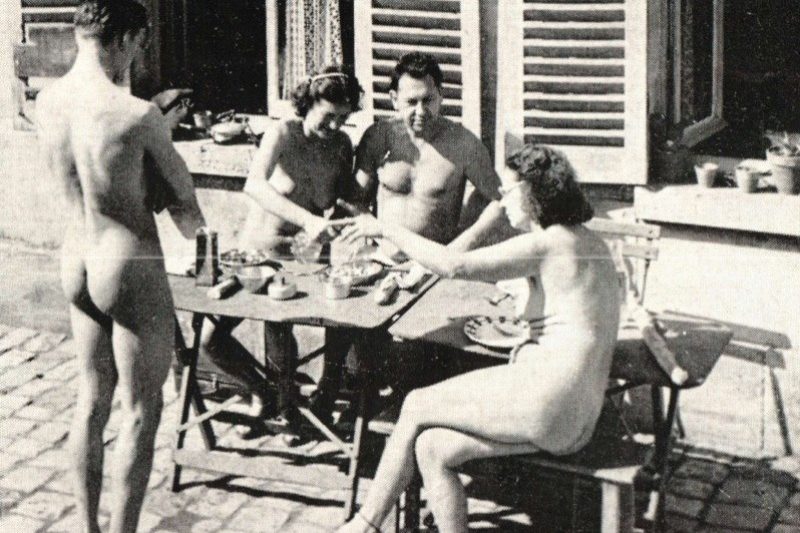Co-founder of the French naturist movement Christiane Lecocq (pictured above 2nd from left at the Club du Soleil in 1950) has died at the age of 103
French naturism is officially in mourning. Christiane Lecocq – its most important founder-member and spiritual leader – died on Christmas Eve at the age of 103 years in her retirement home of Chatou.
After a service in the little town, she was buried alongside her husband Albert at the Carrières-sur-Seine Cemetry, just a few steps away from the Club du Soleil – the famous naturist centre that the couple (both originally from the cooler climes of the north-east of France) opened secretly in 1945, taking care to shield the clandestine nudist colony from the eyes of the public by a substantial barrier of vegetation.
It was one of the founding acts of the naturist movement in France – a movement that was to become the biggest in Europe.
“At the time, only well-off people could afford to go for a holiday in the countryside. We wanted to bring in a social element – to offer the chance of some leisure time to the less well-off, and near to Paris.” So said Mme Lecocq in an interview with Le Parisien a few years ago. Following this audacious start, Albert and Christiane launched the first specialist naturist magazine “La Vie au Soleil”, which is still published today. They then founded the French Naturist Federation (Fédération Française de Naturisme – FNN) in 1950.
That year, they also started the first naturism consultancy forum in the world – in Montalivet in the Gironde. From humble beginnings, over the years it became a major global naturism landmark with almost 20,000 visitors per year. Finally, in 1953, the Lecocq’s created the International Naturism Federation, which was to bring together the different national federations from neighbouring countries.

“In the beginning, we were seeking to live in harmony with nature, to open ourselves to others, to watch what we were eating.”
“With the advent of open beaches, the spirit of the movement has gone in a different direction,” she said regretfully at the beginning of the 2000s. “In the beginning, we were seeking to live in harmony with nature, to open ourselves to others, to watch what we were eating.”
In other words, this trend of “wild naturism” became a way of castigating nudism and was considered by the purists of the movement as an abandonment of the original founding principals. Over the last week or so, thousands of these purists have been putting their thoughts on the Internet, expressing their chagrin at the disappearance of this emblematic figure from their movement.
“She was a real visionary and she wanted to develop the movement,” says Yves Leclerc, vice-president and communications officer of the FFN. “Since the 1950s, she had understood that naturism could be a real tourism product.”
FFN president Armand Jamier echoed the same point, saying: “If France is today the number one naturist tourist destination with 3.5 million people including 1.5 million French, it’s thanks to her in particular.”




 Tootlafrance is Ireland’s fresh new eyes on France, bringing you the latest news, exclusive celebrity interviews, political analysis, cultural events, property news and, of course, travel features written by top Irish journalists.
Tootlafrance is Ireland’s fresh new eyes on France, bringing you the latest news, exclusive celebrity interviews, political analysis, cultural events, property news and, of course, travel features written by top Irish journalists.